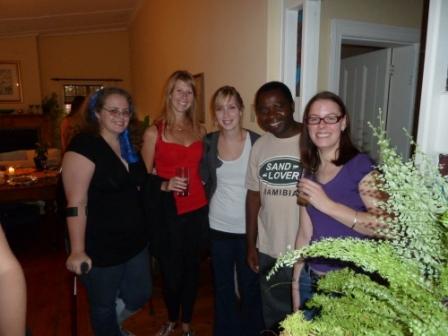
Did language originate in Africa? Rhodes Linguistics postgrads and some staff members enjoyed a rousing and at times rather rowdy discussion on this topic at the department's second Linguistics Evening, held on Friday 27 May (coincidentally, the end of Africa Week) at Ian Siebörger's house.
The conversation was provoked by an article that Hazel Mitchley, a Rhodes Linguistics Honours student, had found in Science magazine. This article, by Quentin D. Atkinson, reported on a study that compared the numbers of speech sounds (phonemes like 'b', 'a' or clicks) in 504 languages from across the world. On average, African languages generally have more different speech sounds than those in Asia and Europe, which in turn have more speech sounds than those in North America, South America and Oceania, in that order.
Atkinson argues that this is good evidence that languages originated in Africa and spread from there to the other continents. His idea is that as one group of people breaks away from another and begins to form their own language group, they will very seldom create new speech sounds, but may well stop using some of the speech sounds found in the original language. This is known as the Serial Founder Effect, and is better known in genetics: a group of people or animals that breaks away from a larger group will have less genetic diversity than its parent population because there are fewer other people to breed with.
Atkinson uses some rather intricate statistics to bolster his claim, but the Rhodes linguists present were far from convinced. For one thing, languages change far more quickly than genes do. It's generally accepted that it's impossible to tell what languages looked like more than 10 000 years ago simply because changes happen at such a rate that the further back you go, the more uncertain your reconstructions of prehistoric languages become. To put this in perspective, English only really began to exist as a separate language 1 000 years ago.
Secondly, it's by no means impossible for languages to create new speech sounds; the process, known as phoneme splitting, is quite well-understood by linguists. Atkinson's research is based on the assumption that the more people speak a language, the more speech sounds it will have. But a little thinking makes this idea seem absurd: if a large number of people who speak a particular language die, do speakers say “Oh dang it, we'll just have to stop using the 't' or 'm' sound”?
If that sounds a little facetious to you, it's only the start of the jokes that kept the party in stitches for most of the evening. Although the Linguistics Evening didn't prove that language originated in Africa, it certainly showed that when you put a roomful of linguists together on a Friday night with some pizza, fun is sure to be the result!
